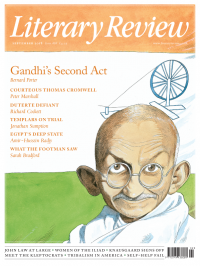Sara Wheeler
A Nonagenarian Writes
In My Mind's Eye: A Thought Diary
By Jan Morris
Faber & Faber 330pp £16.99
Jan Morris, at the start of her tenth decade, has written a 188-day ‘thought diary’, ‘having for the moment nothing much else to write’. It is a splendidly quirky confection that mixes the trivial with the serious, like life.
Some of the entries have been published before, as pieces in the Financial Times or the Welsh-language O’r Pedwar Gwynt. Many, as readers might expect, chew over topics that have long fascinated her, including what she calls the ‘ambiguous epic’ of the late British Empire, the ‘swank’ of which she still enjoys, while acknowledging ‘that it was founded upon fundamental injustice’. Among the events covered by the diary is the appearance of her most recent book, the delightful Battleship Yamato (Pallas Athene), a reflection on the ironies of war examined through a portrait of the Second World War Japanese battleship of that name. Morris confesses to feeling the same excitement at seeing it in print as she felt when her first book appeared in 1956. In the preface to Battleship Yamato, she refers to the book as ‘a sort of illustrated reverie, a literary meditation’, a description that equally well sums up her overall style.
On a gloomy afternoon in her longtime home in north Wales (‘between the mountains and the sea’) she fishes out some Irving Berlin tunes and, while playing them, ruminates on the composer. When she was on Desert Island Discs, every one of her choices was by him, a characteristic dash of Morris showmanship. Berlin was the first American she met. There is a lot about the USA in this book, especially Morris’s beloved Manhattan. Musing on her global travels, she can sometimes be condescending: Australia used to be ‘provincial’, but now ‘its actors and writers are known the world over’.
In My Mind’s Eye includes the author’s bugbears (for example, zoos), her loves (cars, her late cat Ibsen – I met him once, and he was indeed a heart-stopper), scenes of family life, a few poems and a scattering of curious facts, such as the statistic that in Birmingham 89 per cent of people between the ages of fifty-eight and ninety suffer from ingrowing toenails. Readers will find their own favourites, which is one of the joys of a book such as this. I enjoyed the disquisition on the difference between fact and fiction. She says, as ‘an old pro of the writing game’, that she doesn’t even recognise a distinction. The two are ‘irrevocably mingled in my own work, and to one degree or another, I suspect, in most other writers’ work too. The thing is, truth is not absolute.’ I couldn’t agree more, though many authors would be too frightened to be that honest.
Like all good diaries, this one benefits from the strengths of the form: the possibility of being (or sounding) spontaneous and impressionistic. ‘What is it with the birds?’ she asks in entry number forty-five after her daily walk of ‘a thousand paces’, wondering how they remember migratory routes. Topics range from sentimentality to the sea, with frequent references to what Morris considers the most important human virtue: kindness. It’s hard to disagree.
The style is remorselessly chatty: ‘We all talk to our dogs, cats and horses, do we not?’ On contemplating being a goat, an animal she admires, Morris writes, ‘Wow!’ I even liked the dodgy grammar (‘Who are you to believe?’). Morris has a gift for picking out what seems only in retrospect to be obvious: if you are of a certain age, she says, the most emotive volumes in your house are old address books – all those crossings-out, relocations and renamings.
Old age often rears its silvery head. Morris records the symptoms of decrepitude, including a new one: ‘In the middle of the night I awoke with the need to have a shit.’ After a sleepless period she asks, ‘Is this the start of Alzheimer’s?’ Elsewhere she reckons ‘senility can have advantages too’, though I didn’t find her arguments convincing. ‘Ninetys’ Rights’ is her latest cause, and its campaign song begins ‘Hail the old who all know best’.
The cover, depicting Morris in a cardie in front of a blue Morris Minor, is so bad it’s good. Despite her depression at the state of the world, Morris is upbeat throughout these pages and encourages bonhomie all round, including upwards to the deity she doesn’t believe in. ‘Goodnight God!’ she ends one entry, ‘as I turn my bedside light off (if the wretched thing works, that is). Goodnight, and good luck to you!’

Sign Up to our newsletter
Receive free articles, highlights from the archive, news, details of prizes, and much more.@Lit_Review
Follow Literary Review on Twitter
Twitter Feed
Margaret Atwood has become a cultural weathervane, blamed for predicting dystopia and celebrated for resisting it. Yet her ‘memoir of sorts’ reveals a more complicated, playful figure.
@sophieolive introduces us to a young Peggy.
Sophie Oliver - Ms Fixit’s Characteristics
Sophie Oliver: Ms Fixit’s Characteristics - Book of Lives: A Memoir of Sorts by Margaret Atwood
literaryreview.co.uk
For a writer so ubiquitous, George Orwell remains curiously elusive. His voice is lost, his image scarce; all that survives is the prose, and the interpretations built upon it.
@Dorianlynskey wonders what is to be done.
Dorian Lynskey - Doublethink & Doubt
Dorian Lynskey: Doublethink & Doubt - Orwell: 2+2=5 by Raoul Peck (dir); George Orwell: Life and Legacy by Robert Colls
literaryreview.co.uk
The court of Henry VIII is easy to envision thanks to Hans Holbein the Younger’s portraits: the bearded king, Anne of Cleves in red and gold, Thomas Cromwell demure in black.
Peter Marshall paints a picture of the artist himself.
Peter Marshall - Varnish & Virtue
Peter Marshall: Varnish & Virtue - Holbein: Renaissance Master by Elizabeth Goldring
literaryreview.co.uk